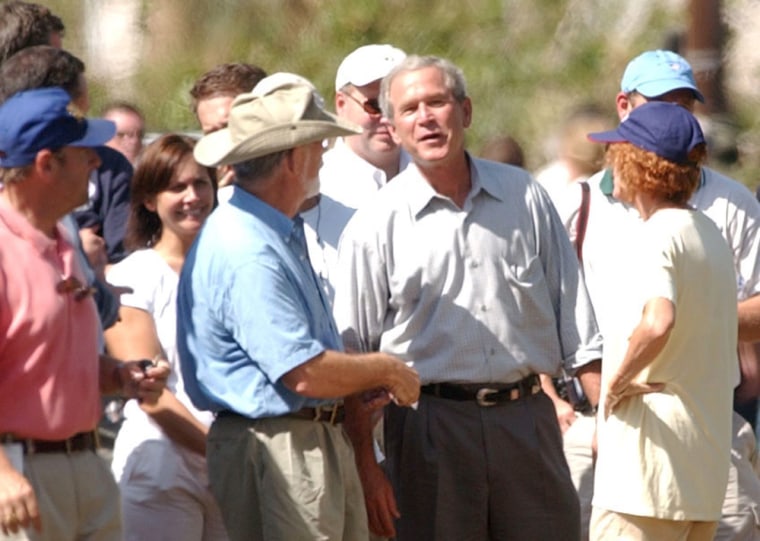It would be premature to say that Hurricane Charley, as powerful as it was, will blow Florida’s 27 electoral votes into the arms of John Kerry.
President Bush and his brother Jeb, Florida’s governor, know the lessons of August 1992, when their father, President George H.W. Bush, reacted too slowly with federal aid to help speed recovery after Hurricane Andrew ravaged Florida.
The now-famous quote that August from Dade County's emergency operations director, Kate Hale — “Where in the hell is the cavalry on this one? For God's sake, where are they?'' — summed up the frustration that many people in Florida voiced in the days after Andrew hit.
(Some of Floridians’ anger was also directed at then-Gov. Lawton Chiles, a Democrat, who delayed asking for federal troops.)
Late Sunday, officials in Florida were focused on the immediate crisis — providing water and electricity and finding missing people — not on strategizing for Election Day.
Sally Tibbetts, the district director for Rep. Katherine Harris, the Republican who represents the 13th congressional district, which includes two counties hard hit by the hurricane, DeSoto County and Hardee County, and a small part of Charlotte County, told MSNBC.com late Sunday in a phone interview from Sarasota she had seen devastation in her visit to Charlotte County.
“Trees on cars, manufactured homes crumbled, windows blown out,” she said. Tibbetts said the Red Cross is working in Charlotte County and “they are very organized.”
FEMA, the Federal Emergency Management Agency, she said, is working in Charlotte County, but officials there are exhausted after working for 72 hours without letup.
The most immediate need, she said, was search-and-rescue teams, because — partly due to cell phone outages — a number of people still can’t locate their relatives.
Mindful of 1992
Asked on Sunday why he showed up so promptly in Florida to inspect the hurricane’s damage, Bush seemed to hint at the criticism of his father 12 years ago: "Yeah, if I didn't come, they would've said we should have been here more rapidly."
He added, “FEMA was on the ground yesterday morning and there’s a lot of supplies surging this way.”
While the focus Sunday was on Florida, next month it could be on floods in Missouri or hailstorms in Iowa. With an election that appears agonizingly close in a dozen or more states, any error in reacting to a natural or man-made disaster could cost Bush the election.
And any such event gives Bush an opportunity to do what Kerry can't: display command of the powers of the presidency.
One reason Bush is aware of the need to rush help to Florida and for people there to see that help is coming: his chief of staff, Andrew Card, was his father's designated point man in 1992 for responding to state requests for help in the wake of Hurricane Andrew.
A fact sometimes overlooked is that despite the criticism of the elder Bush’s response to Andrew, he won Florida in 1992 by more than 100,000 votes over Bill Clinton.
He did so just two months after Andrew hit, even in the face of a strong performance in the state by Ross Perot who got 20 percent of the vote.
Thus there is no simple equation that dictates: “slow hurricane reaction equals losing Florida” or “quick response equals winning Florida.”
It is too soon to say whether a quick and effective response to Charley would help Bush carry Florida on Election Day, only 12 weeks from now.
Non-Charley troubles
Polls of Florida voters showed Bush in trouble in the state well before Charley appeared on the horizon.
A Quinnipiac University poll of 1,094 registered voters, conducted from Aug. 5 through Aug. 10, found that Kerry had a 47 percent to 41 percent lead over Bush, with seven percent undecided and four percent backing Ralph Nader.
Not all of Charley’s damage is yet calculated, but in monetary cost it may fall short of Andrew, the most costly hurricane as calculated by the National Oceanic and Atmospheric Administration (NOAA). That hurricane caused $26.5 billion in damage.
A 2001 NOAA study of the costliest and deadliest hurricanes in U.S. history noted that, “Continued coastal growth and inflation will almost certainly result in every future major land-falling hurricane (and even weaker hurricanes and tropical storms) replacing one of the current costliest hurricanes.”
As more people move to Florida, the value of the real property in the state rises. NOAA added, “In the absence of a change of attitude or laws restricting building near the ocean… large property losses are inevitable.”
While storms such as Charley underscore the risks of moving to Florida and may slow the state’s population growth, it will remain crucial in future presidential elections.
Population growth over the past 30 years is the primary reason why Florida, now the fourth most populous state, is a glittering prize in electoral vote calculations.
In 1960, 1.5 million people voted in the presidential election in Florida and the state only had 10 electoral votes, about four percent of the number needed to win the presidency.
This November, more than 6.5 million Floridians are likely to cast ballots for president and the state’s 27 electoral votes will account for 10 percent of the number needed to win the White House.
